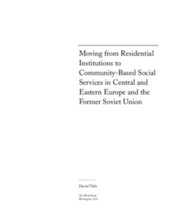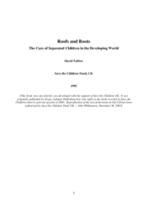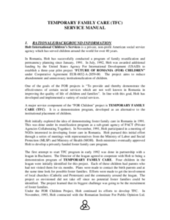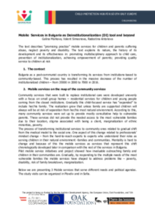Displaying 651 - 660 of 665
A paper describing a study that reviewed the role of institutional care in Albania, Armenia, Latvia, Lithuiania and Romania, where the World Bank worked to develop community based care social services and move away from large residential institutions that according to the paper have deleterious affects on the nations and on the people who live in them. Particularly, the study focuses on the use of residential institutions by children, people with disabilities and the frail and isolated elderly.
A summary of Ugandan child care and protection policies that have sought to de-institutionalize care, provide family tracing and re-unification, and improve community care.
Save the Children’s research and analysis of residential care services and the need for alternative non-institutional approaches for children separated from their families. This book examines policy and practices from work in Africa, Asia, Latin America and the Caribbean, and Eastern and Central Europe.
A manual for the establishment of foster care in Romania as an alternative to the institutional placement of children. Addresses the legal framework, policies, processes, responsibilities and administration surrounding creating and maintaining a foster care system.
This Massive Online Open Course (MOOC) provides an overview of the necessary elements to safely transition children from institutions to families and family-like care settings.
As part of phase one of the development of the Martin James Foundation's Asia Care Network, comprehensive studies of the care system in each country were conducted to highlight the need for developing alternative care systems across South-East Asia.
This text describes “promising practice” mobile services for children and parents suffering abuse, neglect poverty and disability in Bulgaria.
As part of phase one of the development of the Martin James Foundation's Asia Care Network, comprehensive studies of the care system in each country were conducted to highlight the need for developing alternative care systems across South-East Asia. This case study highlights relevant data from Thailand.
This website, developed by One Sky Foundation for the Convention on the Rights of the Child Coalition for Thailand Alternative Care Working Group, provides access to resources on alternative care in Thailand.





